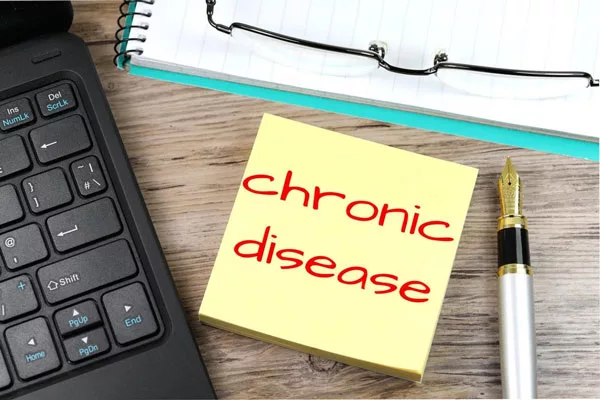Chronic Conditions: A Comprehensive Guide for Seniors to Manage and Prevent Long-Term Illnesses
- Introduction
- Most Common Chronic Diseases in Seniors
- Causes of Chronic Disease
- Chronic Disease Symptoms
- Chronic Illness Examples
- Chronic Diseases List
- How to Prevent Chronic Disease
- Living with Chronic Conditions
- Starting a Blog: Your Health Journey
- Conclusion
- Frequently Asked Questions
Introduction
Chronic Conditions are not to be ignored. In this complete guide, we explore the most common ailments that affect the elderly, their causes, symptoms and prevention strategies. The elderly population faces unique health challenges and higher prevalence of chronic diseases, so specialized care is necessary.
Our expert advice and insights will be your roadmap to navigating long term health issues. The aging process brings about natural changes in the body that can affect the development and management of chronic diseases in older adults.
From articles that break down treatment options to empowering you to take control of your health, we’ve got you covered. Start your journey to better health today.
Most Common Chronic Diseases in Seniors
Heart Disease
The heart is like that old car you’ve had for years; it needs regular maintenance. Heart disease is the number one cause of death among seniors and high blood pressure is a major contributor to heart disease in this age group. Monitoring blood pressure is key to good heart health in older adults. Lifestyle changes can make a big difference.
Risk factors like age, diet and inactivity play a big role in the development of heart disease. Cardiovascular disease includes heart disease and related conditions, so it’s a big health concern for seniors. Ischemic heart disease, a type of cardiovascular disease, is especially common in older adults due to age related vascular changes and atherosclerosis.
Diabetes
Oh sugar, the sweet enemy. Diabetes is another common condition among seniors. High blood sugar is the hallmark of diabetes and can lead to serious complications like kidney disease, heart disease and vision problems. The risk of developing diabetes increases as we age, so prevention and early detection is especially important for older adults. Weight gain especially in seniors can further increase the risk of developing diabetes. Monitoring blood sugar and making dietary changes are crucial.
Arthritis
Those creaky joints aren’t just a sign of old age; it could be arthritis. Pain management is a big part of arthritis care for seniors, as chronic pain can impact quality of life. There’s no cure but treatments can manage symptoms. Chronic inflammation is a major contributor to the progression of arthritis, leading to joint pain, swelling and stiffness. Muscle weakness is also a common symptom in older adults with arthritis, often contributing to reduced mobility and increased risk of falls.
Alzheimer’s Disease
Memory issues can be more than just “senior moments.” Alzheimer’s is a progressive disease that affects memory and other cognitive functions. Cognitive impairment is a core symptom of Alzheimer’s disease, leading to decline in mental abilities and daily life.
Respiratory Diseases
Breathing issues can severely impact quality of life. Chronic obstructive pulmonary disease (COPD) is a progressive respiratory condition that affects older adults and includes chronic bronchitis and emphysema as its main components. Chronic bronchitis, characterized by persistent cough and mucus production, is a common part of COPD and can be caused by long term exposure to irritants like smoking. Conditions like COPD and asthma are common among older adults. Eating healthy is important for managing chronic bronchitis and overall respiratory health.
Causes of Chronic Disease
Genetics
You can thank your family tree for this one. Genetic predisposition plays a role in many chronic conditions.
But genetic factors are not the main causes of chronic diseases
Lifestyle Choices
Smoking, lack of exercise and poor diet are major contributors. Time to put down that cigar and pick up a carrot!
Environmental Factors
Pollution and other environmental factors can also contribute. Maybe it’s time to consider that move to the countryside?
Let’s face it; getting older comes with its own set of challenges, including higher risk of chronic diseases.
Chronic Disease Symptoms
If you’re feeling off but can’t put your finger on why, it might be time for a check-up. Common symptoms like fatigue, unexplained weight loss and frequent urination should not be ignored.
Chronic Illness Examples
Meet Bob. He’s 70 years old and has been managing his diabetes for years. Through diet and medication, he’s living a full life. Stories like Bob’s are common and remind us that chronic conditions are manageable.
Older patients face similar challenges and successes in managing chronic illness.
Chronic Diseases List
From hypertension to osteoporosis and other chronic diseases, the list is long. Age related diseases like dementia and arthritis are part of this list and often require specialized care. Seniors are affected by many health conditions that can impact their quality of life. But don’t worry; knowledge is power!
How to Prevent Chronic Disease
Diet and Nutrition
Eat a balanced diet rich in fruits, veggies and lean protein. For seniors, a healthy diet helps manage high cholesterol, reducing the risk of heart disease and related conditions. Proper nutrition is key to maintaining bone density and preventing osteoporosis.
Exercise and Physical Activity
Get moving! Even 30 minutes a day can make a difference.
Exercise helps preserve muscle mass and strength in seniors, reducing the risk of sarcopenia.
Stress Management
Stress can kill you. Meditation and relaxation techniques can help.
Regular Medical Check-ups
An ounce of prevention is worth a pound of cure, as they say. Regular check-ups can catch issues before they become big problems.
Living with Chronic Conditions
Managing a chronic condition is like having a part-time job you didn’t apply for. Chronic conditions can lead to poor health if not managed properly, increasing the risk of complications and reducing quality of life. Many health problems like mobility issues, pain and fatigue can arise from chronic disease in the elderly. But with the right approach, you can still live a good life.
Starting a Blog: Your Health Journey
Ever thought of sharing your health journey? Starting a is easier than ever in 2023, thanks to AI. You can share tips, recipes or even just vent. It’s therapeutic and can even make you some extra cash!
Conclusion
Chronic conditions may be a part of life, especially as we age, but they don’t have to define us. With the right knowledge and lifestyle changes, you can manage your health well. Proactive management of chronic disease supports healthy aging and a better quality of life as you get older.
Frequently Asked Questions
What are the most common chronic diseases in seniors?
Heart disease, diabetes and arthritis.
How can I prevent chronic diseases?
Lifestyle changes like a balanced diet and exercise.
What are chronic conditions?
Chronic conditions are long term health issues that require ongoing management.
How Often Should I Get Checked for Chronic Conditions?
At least once a year, or more often if you have existing health issues.
What’s the Difference Between Acute and Chronic Conditions?
Acute conditions are severe but short term, like a broken bone or a cold. Chronic conditions are long term and often require ongoing treatment and management.
Can Chronic Diseases Be Cured?
While some chronic diseases can be managed to the point where they have little impact on your life, most of them have no cure. The focus is usually on management and quality of life.
What Role Does Genetics Play in Chronic Conditions?
Genetics can play a big role. If chronic conditions are common in your family, you may be at higher risk and should discuss this with your doctor.
How Do Lifestyle Choices Affect Chronic Conditions?
Lifestyle choices like diet, exercise, smoking and alcohol consumption can impact the likelihood of developing a chronic condition and managing it.
What Are the Financial Implications of Having a Chronic Condition?
Managing a chronic condition can be costly. Medications, regular doctor visits and occasional hospital stays can add up. You should consider this in your financial planning
Can I Live a Normal Life with a Chronic Condition?
Yes! With the right management plan, many people with chronic conditions live full active lives.
How Can Technology Help in Managing Chronic Conditions?
From health monitoring apps to telemedicine, technology offers many ways to make managing chronic conditions easier and more efficient.
What Resources Are Available for People with Chronic Conditions?
Various organizations and online communities offer support and resources for people with chronic conditions. Don’t hesitate to reach out.
Is It Too Late to Make Lifestyle Changes That Impact My Chronic Condition?
It’s never too late! Even small changes can make a big difference in how you feel and how well you can manage your condition.
How Can I Learn More About My Chronic Condition?
Knowledge is power. Read reputable sources, talk to your doctor and consider joining a support group to learn more.
What About Mental Health and Emotional Wellbeing in Chronic Conditions?
Mental health is linked to physical health. Stress, depression and anxiety can make physical symptoms worse, so holistic care that includes mental health is key.




One Comment
Comments are closed.